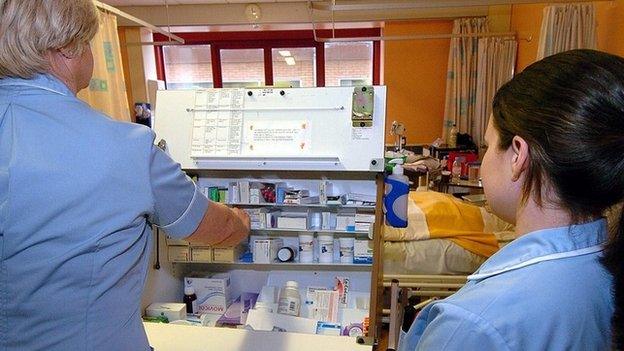The NHS, devolution, and the election
- Published
- comments

A couple of weeks ago I noted that the devolution of funding and decision-making for health and social care to Greater Manchester went some way to fulfil a long-running Treasury ambition for the NHS to be - in effect - broken up.
What is striking is that this devolution may have been decades in the making, but it is moving ahead swiftly - from rough concept in November's outline plans for transferring more powers to the regions, to announcement last month.
And an official memorandum published in February says, external that the integration of the £6bn health and social care budgets for the region will take place in "shadow" form as soon as next month, with full devolution scheduled for April 2016.
Which you might think is an encouraging sign that the government is still governing, is pressing ahead with important reforms, and is not being completely distracted by the looming general election.
Just perhaps, you might see it as slightly undignified and worrying haste.
Or, if you are Lord Owen - the former Labour foreign secretary and a medical doctor - you will see it as a constitutional outrage.
'Collaborative working'
Now as it happens, Lord Owen is in favour of the regional control of health spending.
But he has written to the cabinet secretary, Sir Jeremy Heywood, arguing that the authorisation of central government civil servants and health managers "to embark on a major new process for collaborative working in shadow form from 1 April ...is a serious abuse of past conventions, let alone in the new circumstances of a fixed Parliament when the date of an election has been known, in effect, for five years".
He believes that work to create the integrated health and social care service for Manchester in the coming weeks breaches a prohibition on rushing through policies that could secure political advantage for the ruling party (or parties) during the run up to a general election.
So he has urged Sir Jeremy to "immediately rule that this MOU [memorandum of understanding] is unacceptable in its starting date". And he says that the shadow operation of the new health and social care authority should not begin until authorised by whoever is health secretary after the 7 May poll.
Lord Owen is awaiting a response. But I am told that the thrust of Sir Jeremy's response will be that the work of the Manchester shadow health organisation will primarily be to develop a proper business plan for the real thing.
And it will only be on the basis of this business plan that any new government would give formal approval for any transfer of health powers to happen in a formal sense, in October this year.
So he will argue that the new government - of whatever colour - will have the right and duty to say "yes" or "no" to whether this devolution happens.
Constitutional niceties
The chances of this satisfying Lord Owen are slim. And I suspect this argument will rumble on - partly because Owen and Heywood have a history of argy-bargy on these constitutional niceties.
Lord Owen wrote to the cabinet secretary just under a year ago, because he was uneasy that the Prime Minister had written to 1.7 million company and charity directors extolling the virtues of the Budget.
He had two concerns. First, that the letter had come from David Cameron, rather than the Treasury.
Second, that it was sent quite close to the elections for the European parliament.
In his response, Sir Jeremy acknowledged that "this is the first time a prime minister has decided to communicate directly with taxpayers in this way".
But he did not see this as a constitutional calamity because he saw the letter as part of a campaign to raise awareness of an "Employment Allowance" that would reduce employers' National Insurance contributions.
And Sir Jeremy was clear that the timing of the letter was not "in advance of the sensitive period for communications with the public in advance of the elections".
That said, it is odd that the letter came from David Cameron, not from the Chancellor. Also, I have been told that Sir Nick Macpherson, the Treasury Permanent Secretary, was a bit concerned that the letter was a bit too close to being a PR stunt for the Tories.
So I put this to the Prime Minister's official spokesman, who said that try as he might he can find no record of Sir Nick being anxious that public money and resources had been used for party-political gain.